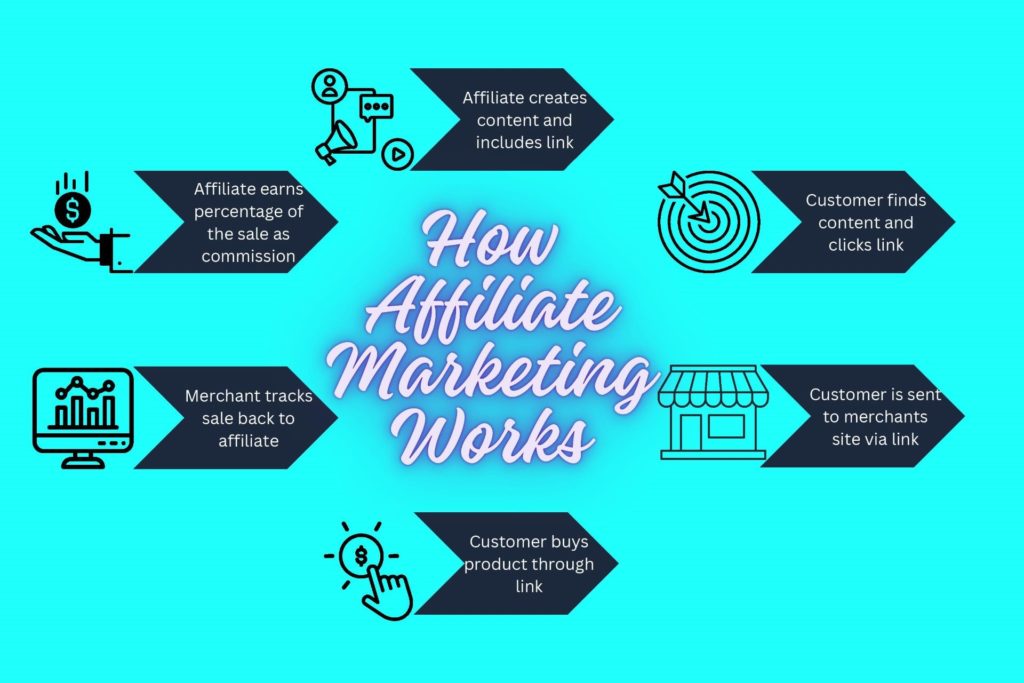Table of Contents
Introduction to Affiliate Marketing
If you ever considered turning your passion for blogging, social media, and content creation into a source of income, you’ve come to the right place.
In this article, we’ll cut through the noise and guide you through the important steps needed to ensure affiliate marketing success in your business.
What is Affiliate Marketing?
Affiliate marketing is sort of like a modern-day matchmaker, linking enthusiastic consumers with products or services they’re sure to love.
Imagine coming across a new gadget that you think is just the coolest thing ever and you can’t wait to tell everyone. Here’s where affiliate marketing comes in.
Rather than merely sharing your enthusiasm without reward, affiliate marketing offers the opportunity to get paid for every sale a customer uses your referral link to buy the product through.

How Does Affiliate Marketing Work?
Imagine being a fitness enthusiast with a growing Instagram following, and you discover a game-changing protein powder that has revolutionized your workout routine.
The company behind this amazing product offers you a unique link to track sales from your promotions.
You effortlessly incorporate this link into your Instagram posts, stories, or bio, urging your followers to try out the protein powder and enjoy its benefits. And guess what? Every time someone clicks on your link and makes a purchase, you earn a share of the profits.
Why Affiliate Marketing is Important?
Just imagine, if given an opportunity to earn money from what you love doing like fashion, cooking, traveling, or gardening for instance without worrying about inventory management as well as customer service or shipping.
By means of affiliate marketing, it is feasible to concentrate on your hobbies and create engaging content while brands will manage everything in terms of operations. This way, everybody wins. You get commissions, your followers come across great products they are interested in while brands promote their products through you.
Getting Started with Affiliate Marketing
Building a solid foundation in your business will ensure affiliate marketing success.
Choosing a Niche: Finding something you can talk about for hours
Whether you’re crazy about fashion, fitness, finance, or furry friends, there’s a niche waiting for you to make your mark. Remember, the key is to select a niche that not only sparks your enthusiasm but also resonates with your target audience.
Think about your hobbies, interests, and expertise. What topics could you talk about for hours on end? What problems can you solve for your audience? By choosing a niche that aligns with your passions and expertise, you’ll set yourself up for success in the long run.
Researching Affiliate Programs: Finding the Perfect Partnerships
Once you’ve identified your niche, it’s time to scout out potential affiliate programs that align with your interests and audience. Most products or services offer an affiliate program where you can sign up to start promoting whatever they offer.
You can usually find a place to sign up with them on the footer of their website. But, if you can’t find anywhere to sign up, then you could always shoot them a quick email explaining that you are interested in promoting their product or service. They will usually be happy to work with you and might even have some promotional material that will help you, help them get more customers (and you a sweet affiliate commission) —Just always be sure to partner up with reputable brands that offer products or services you genuinely believe in and can wholeheartedly endorse.
Start by exploring reputable affiliate networks like Amazon Associates, ShareASale, or Commission Junction, where you’ll find all kinds of affiliate programs across various industries. Be sure to check each program’s details, considering factors like commission rates, cookie durations, payment methods, and promotional resources.
Look for programs that offer products or services your audience will love and that provide ample support for their affiliates. Remember, quality trumps quantity. It’s better to partner with a few high-quality affiliate programs than to spread yourself too thin with countless mediocre ones.

Setting Up Your Affiliate Marketing Platform
Now that you’ve chosen your niche and selected your affiliate programs, it’s time to set up your affiliate marketing platform—the digital hub where all your awesome content will live.
Whether you’re starting with a blog, website, YouTube channel, or social media presence, your platform serves as your online storefront, showcasing your content and affiliate recommendations to the world. Keep it simple, user-friendly, and visually appealing.
Customize your platform to reflect your brand personality and niche expertise. Integrate your affiliate links seamlessly into your content, ensuring they blend organically with your recommendations. And don’t forget to track your affiliate performance using analytics tools to optimize your strategies and maximize your earnings.
Understanding Affiliate Marketing Strategies
The dynamic trio of content marketing, email marketing, and social media strategies
Content Marketing for Affiliate Success
Content marketing is essential for affiliate success. It helps you build strong connections with your audience and establish yourself as a reliable advisor in your field. Whether you write blog posts, make videos or record podcasts, your content acts as a bridge to your affiliate promotions.
Share your personal experiences, insights, and recommendations genuinely, and see how your audience eagerly follows your lead. Remember, quality is more important than quantity.
Focus on creating valuable, relevant, and engaging content that resonates with your audience’s needs and desires. By providing genuine value and solving their problems, you’ll gain their trust and loyalty, ultimately boosting your affiliate earnings.
Email Marketing and Affiliate Campaigns
Strategically build your email database by offering attractive incentives like exclusive content, freebies, or discounts to attract subscribers. Then, keep your subscribers engaged with valuable content, personalized recommendations, and irresistible offers that cater to their interests and preferences.
When it’s time to promote your affiliate products or services, do it skillfully. Craft persuasive emails that highlight the benefits of the products or services you’re promoting, include irresistible call-to-action buttons, and watch as your inbox fills with clicks and conversions.

Social Media Strategies for Affiliate Marketers
As an affiliate marketer, harnessing the power of social media can catapult your affiliate earnings to new heights. Start by identifying the platforms where your audience hangs out—whether it’s Instagram, Facebook, Twitter, or TikTok—and show up consistently with valuable content that resonates with their interests.
Engage authentically with your followers, sparking conversations, answering questions, and building genuine connections. And when it’s time to sprinkle in your affiliate promotions, do it tactfully. Incorporate your affiliate links organically into your posts, stories, or videos, and always prioritize adding value to your audience’s lives.
Remember, social media is all about building relationships, not just making sales. By fostering a community of loyal fans and followers, you’ll create a ripple effect of trust and loyalty that pays dividends in the long run.
Creating Content that Converts
The essential elements of creating content that not only engages your audience but also converts them into loyal customers.
Writing High-Converting Product Reviews
Imagine this: You’ve discovered a life-changing product that has completely transformed your life. Now, picture being able to express your excitement and enthusiasm to your audience through an engaging product review that leaves them eager to make a purchase. This is the power of effective product reviews, where captivating storytelling meets genuine experiences.
Share your personal journey with the product, highlighting its features, advantages, and how it has positively impacted your life. Be open about both the strengths and weaknesses, providing your audience with an honest and unbiased evaluation.
Additionally, include compelling calls-to-action, encouraging your readers to take the next step and experience the magic for themselves..
Crafting Compelling Call-to-Actions
Crafting effective calls to action is an art that requires a careful balance of persuasion, urgency, and clarity. Whether it’s a button, a link, or a simple text prompt, your call to action should be irresistible, motivating your audience to take immediate action.
Use persuasive language that appeals to their emotions and desires, such as “Start Now,” “Claim Your Discount Today,” or “Unlock Exclusive Access”. Create a sense of urgency by including time-sensitive phrases like “Limited Time Offer” or “Act Fast Before It’s Gone”. And always ensure clarity, clearly stating the action you want your audience to take next.
With a well-crafted call-to-action, you’ll smoothly guide your audience through the conversion journey, turning casual browsers into enthusiastic buyers.
Utilizing Visual Content for Affiliate Marketing
Visuals are a powerful tool in affiliate marketing. They can capture attention and engage viewers. Whether it’s images, videos, or infographics, visual content can stop people from scrolling and make them want to learn more.
Use visuals strategically in your content to enhance your written words and reinforce your affiliate recommendations. Show the product in action, highlight its features, and evoke emotions that resonate with your audience.
Encourage your audience to share their experiences with the product through user-generated content, adding authenticity to your promotions.
With the right visual content, you can create an immersive experience that inspires action and boosts conversions.
Optimizing Affiliate Marketing Performance
Strategies for optimizing your content based on data analysis
Track and Analyze Affiliate Campaigns
Tracking and analyzing your affiliate campaigns is crucial for gaining valuable insights and making informed decisions.
Start by implementing reliable tracking methods, such as affiliate network analytics, custom tracking codes, or dedicated tracking platforms.
Keep an eye on important metrics like click-through rates, conversion rates, and earnings per click to assess the performance of your campaigns.
Identify the top-performing products, channels, and strategies, and focus more on what works while making adjustments to what doesn’t. Also, pay attention to your audience’s feedback, analyze engagement metrics, and adapt your approach based on their preferences and behaviors.
By closely monitoring your data, you’ll uncover the secrets to optimizing your affiliate marketing performance and achieving sustainable growth.

Split Testing Strategies for Optimization
In the world of affiliate marketing, experimentation is your best friend. Split testing—or A/B testing—is your secret weapon for fine-tuning your approach and maximizing your results. Start by identifying variables you want to test, whether it’s your headlines, call-to-action buttons, or promotional strategies.
Create multiple variations of your content or campaigns, making subtle tweaks to each version. Then, unleash your experiments into the wild, tracking the performance of each variation closely. Analyze the results rigorously, identifying patterns, trends, and insights that emerge. Did changing the color of your call-to-action button increase conversions? Did tweaking your headline lead to higher engagement?
Use the data-driven insights from your split tests to refine your strategies, optimize your campaigns, and continuously improve your affiliate marketing performance over time. Remember, Rome wasn’t built in a day—and neither is a high-converting affiliate marketing empire. Stay patient, stay persistent, and keep testing until you find the winning formula that works for you.
Compliance and Legal Considerations
Maintaining compliance with disclosures, disclaimers, guidelines, and policies.
Disclosures and FTC Guidelines
Imagine stumbling upon an awesome product recommendation, only to later find out it was a paid endorsement hidden behind a veil of secrecy. Not exactly the best way to win over your audience’s trust, right? That’s where disclosures and FTC guidelines come into play, ensuring transparency and integrity in your affiliate marketing endeavors.
The Federal Trade Commission (FTC) requires affiliate marketers to disclose any material connections or financial interests they have with the products or services they promote. This means clearly and conspicuously disclosing your affiliate relationships in a way that’s easily understood by your audience.
Whether it’s through a disclaimer on your website, a mention in your content, or a hashtag in your social media posts, transparency is key. So, don’t be afraid to pull back the curtain and let your audience know when you’re earning commissions from affiliate links—it’s not just a legal requirement, but also a trust-building opportunity that strengthens your bond with your audience. And hey, it doesn’t cost them anything extra to buy through your link so they will usually be happy to help if they did gain some value from your recommendation.
GDPR and Affiliate Marketing
In today’s data-driven world, privacy is paramount. Enter the General Data Protection Regulation (GDPR)—a comprehensive set of data protection laws designed to safeguard the personal information of individuals within the European Union (EU). Fun stuff, huh?
While affiliate marketers may not directly handle sensitive personal data like other businesses, it’s still important to understand and comply with GDPR regulations, especially if you have EU-based audience members or customers. This means obtaining explicit consent before collecting any personal data, providing clear and transparent privacy policies, and respecting individuals’ rights to access, rectify, or erase their data.
By prioritizing privacy and data protection in your affiliate marketing efforts, you not only comply with legal requirements but also demonstrate your commitment to ethical business practices and customer trust.
Tax Implications for Affiliate Income
Ah, taxes—the inevitable reality of financial success. While affiliate marketing offers unparalleled opportunities for earning passive income, it’s essential to understand the tax implications of your earnings and ensure compliance with local tax laws.
Depending on your jurisdiction and income level, you may be required to report and pay taxes on your affiliate earnings, whether it’s self-employment income, business income, or miscellaneous income. Keep meticulous records of your affiliate earnings and expenses, consult a tax professional to understand your tax obligations, and file your taxes accurately and on time.
Remember, staying on the right side of the taxman not only avoids legal trouble but also ensures your financial success is built on a solid foundation of compliance and integrity.
Advanced Affiliate Marketing Techniques
The art of building relationships with merchants, leveraging SEO for affiliate success, and exploring alternative revenue streams that could increase your income potential.
Building Relationships with Merchants
When it comes to affiliate marketing, building strong relationships with merchants is the key to unlocking exclusive opportunities, earning higher commissions, and securing long-term success. Take the time to get to know the merchants you’re working with—reach out, introduce yourself, and express your genuine interest in their products or services. Share your passion for their brand and your vision for how you can collaborate to drive mutual success.
Whether it’s negotiating higher commission rates, accessing exclusive promotions or resources, or co-creating custom content and campaigns, cultivating strong relationships with merchants opens doors to a world of possibilities. So, don’t be afraid to roll up your sleeves, extend a friendly handshake, and start building those valuable partnerships that propel your affiliate marketing career forward.

Leveraging SEO for Affiliate Success
By mastering the art of search engine optimization (or SEO as you might have heard it being called from fellow affiliate marketers), you can skyrocket your affiliate marketing success and claim your rightful place at the top of search engine results pages.
Start by conducting thorough keyword research to identify high-volume, low-competition keywords relevant to your niche and target audience. Optimize your content strategically, incorporating your target keywords into your titles, headings, meta descriptions, and body copy. Create high-quality, informative content that provides genuine value to your audience and answers their burning questions. And don’t forget about the technical aspects of SEO—optimize your website speed, mobile-friendliness, and site architecture to ensure a smooth user experience and keep search engines happy.
With a solid SEO strategy in place, you’ll attract organic traffic like bees to honey and position yourself as a trusted authority in your niche. Just be sure to always create content based on what your readers would gain value from rather than just trying to make search engines happy.
Exploring Alternative Affiliate Revenue Streams
In the ever-changing world of affiliate marketing, being adaptable is crucial. While traditional affiliate marketing is profitable, exploring other ways to earn money and protect your business from unexpected changes is important.
Think outside the box and consider offering consulting services, creating digital products or courses, or monetizing your expertise through sponsored content or speaking engagements. Additionally, don’t underestimate the power of passive income streams like affiliate networks, referral programs, or membership sites, which can generate revenue automatically. By diversifying your income streams, you’ll build a strong and resilient affiliate marketing business that can thrive in any economic situation.
Resources and Tools for Affiliate Marketers
Essential resources and tools every affiliate marketer should know about
Affiliate Networks and Platforms
Let’s talk about the magic of affiliate networks and platforms—the central hubs where merchants and affiliate marketers come together to forge profitable partnerships. Whether you’re looking to promote physical products, digital downloads, or subscription services, there’s an affiliate network or platform out there to suit your needs.
From industry giants like Amazon Associates and ShareASale to niche-specific platforms like ClickBank and CJ Affiliate, affiliate networks offer a diverse array of products and opportunities for affiliate marketers. Explore different networks, sign up for affiliate programs that align with your niche and audience, and start monetizing your online presence like never before.
Recommended Affiliate Marketing Tools
From keyword research and content creation to link management and performance tracking, there’s a tool for every aspect of the affiliate marketing process. Some of the recommended affiliate marketing tools include:
- Ahrefs: A powerful SEO tool for keyword research, competitor analysis, and backlink tracking.
- Canva: An easy-to-use graphic design tool for creating eye-catching visuals and promotional materials.
- ThirstyAffiliates: A WordPress plugin for managing and cloaking affiliate links, which will help to keep your website clean and organized.
- ConvertKit: An email marketing platform for building and nurturing your subscriber list, driving engagement, and promoting affiliate offers.
By leveraging these recommended tools, you can streamline your workflow, automate repetitive tasks, and focus your time and energy on high-impact activities that drive results.
Training Courses and Further Learning Opportunities
In the ever-evolving world of affiliate marketing, continuous learning is the key to staying ahead of the curve and maximizing your success. Fortunately, there’s no shortage of training courses, workshops, and learning resources available to help you sharpen your skills, expand your knowledge, and elevate your affiliate marketing game. Whether you prefer self-paced online courses, live webinars, or in-person workshops, there’s a learning opportunity out there to suit your preferences and learning style. Some recommended training courses and resources include:
- Affiliate Marketing Mastery by Stefan James: A comprehensive online course that covers everything from niche selection and content creation to traffic generation and conversion optimization.
- The Authority Site System by Authority Hacker: A step-by-step blueprint for building and growing authority websites that generate passive income through affiliate marketing.
- Affiliate Summit: An industry-leading conference and networking event for affiliate marketers, featuring keynote speakers, educational sessions, and networking opportunities.
By investing in your growth and education, you’ll arm yourself with the knowledge, skills, and strategies you need to thrive in the competitive world of affiliate marketing.
Whether you’re looking into affiliate networks and platforms, checking out recommended tools, or investing in further learning opportunities, remember to leverage these resources to empower your affiliate marketing journey and achieve your goals.
Frequently Asked Questions
What is the average income of an affiliate marketer?
While beginners might earn less than $100 per month, experienced marketers can make over $100,000 per month! It depends on you’re willingness to put in the work and commitment to continuously learning new ways to stay ahead of the competition.
Is affiliate marketing worth it for beginners?
The amount a beginner can make with affiliate marketing depends on factors like niche selection, the product or service you are promoting, how effective your promotions are, the quality of your content, etc. As long as you provide value for your audience, stay consistent, and commit to continuous learning, then you will have a solid chance of building a successful and sustainable affiliate business over time.
What is the best way for a beginner to start affiliate marketing?
For beginners, starting with these steps can be effective:
1. Choose a niche: Select a specific area of interest where you can focus your efforts.
2. Research affiliate programs: Look for programs that align with your niche and offer products or services you believe in.
3. Build a platform: Create a blog, website, or social media presence to promote affiliate products.
4. Create valuable content: Produce high-quality content that educates, entertains, or solves problems for your audience.
5. Drive traffic: Utilize SEO, social media, email marketing, and other strategies to attract visitors to your platform.
6. Monitor and optimize: Track your results, analyze what works and what doesn’t, and make adjustments to improve your performance over time.
7. Be patient and persistent: Affiliate marketing takes time and effort to see significant results, so stay consistent and keep learning as you go.




